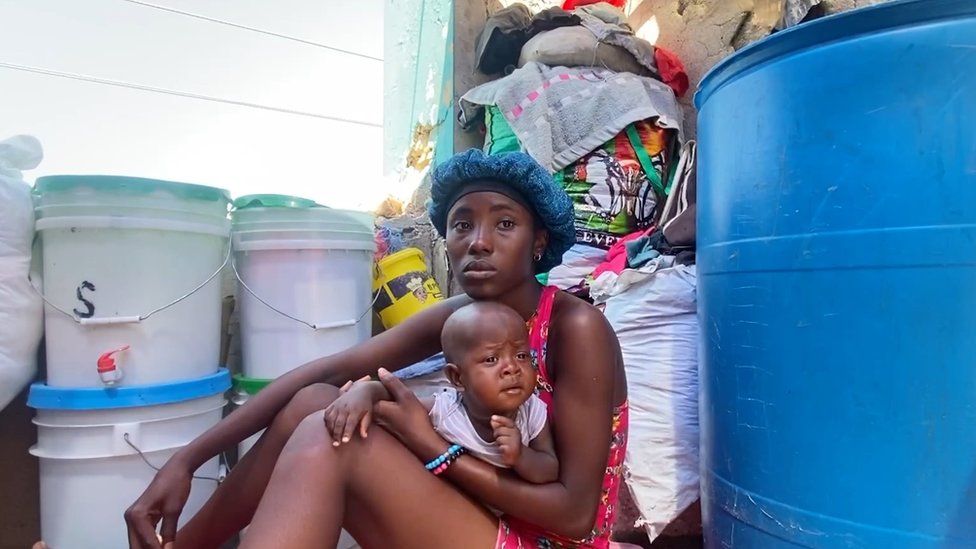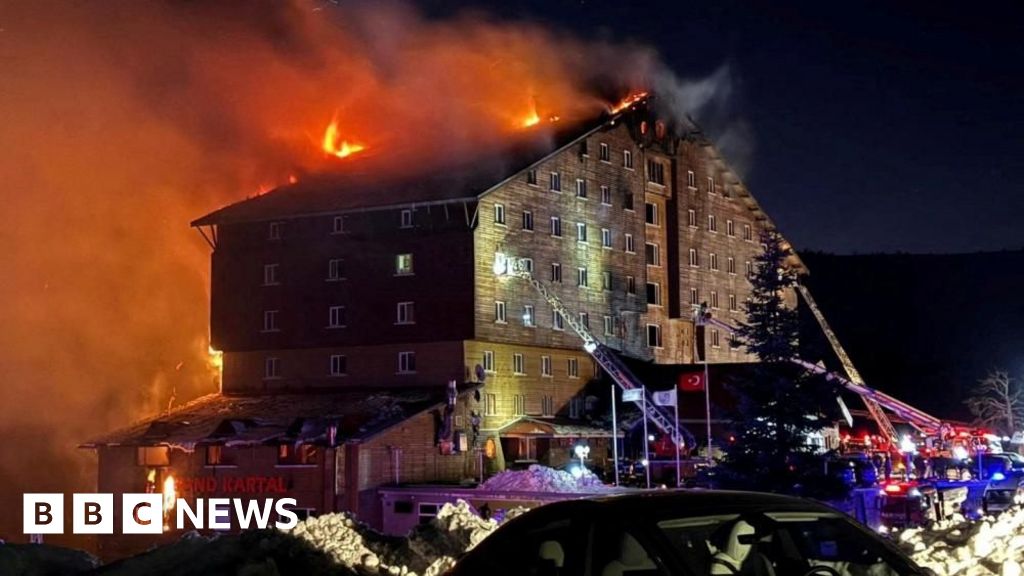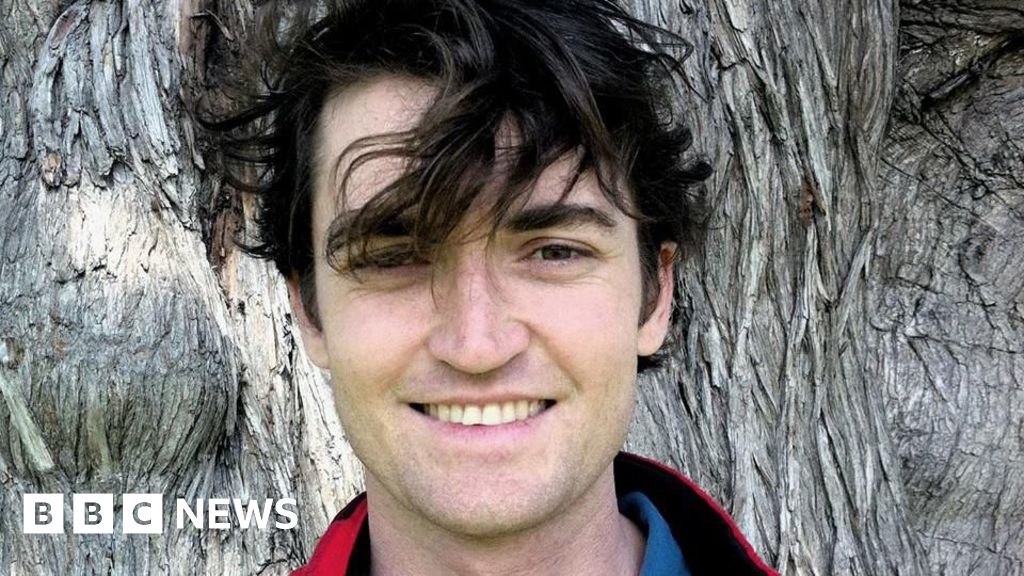ARTICLE AD BOX

Sarah Molin's family are dependent on scarce donations and aid on the days they cannot raise $6 for food
By Will Grant
BBC News, Cap-Haitien, Haiti
Sarah Molin's life reflects the depth of Haiti's problems.
A year ago, the 20-year-old was a computer science student living in a suburb of the capital, Port-au-Prince.
But the failed state that Haiti is rapidly becoming has failed its young people most of all.
Months of turmoil and political instability following the murder of President Jovenel Moïse in July 2021 have culminated in the current spate of extreme gang violence.
The fighting has already claimed many thousands of victims, from those whose bodies lie strewn in the streets, to others like Sarah and her family who were forced from their home last August and now live inside an abandoned cinema.
Around 100 families have set up a makeshift camp inside the condemned building which, under normal circumstances, would not be deemed fit for human habitation. There is no sewerage or running water, and Sarah says their daily struggles to find food are becoming critical.
"Sometimes we find food, sometimes we don't," she explains in a weary voice.
Juggling her baby godson on her knee - her extended family is all in the camp at the disused Rex Cinema - she gives the appearance of a much older woman.
"I go to school with no food, spend the day hungry and then go to bed still with nothing in my stomach," she explains.
Many in the camp are suffering from illnesses. Sarah says disease is now spreading through their squatter community. Drugs and medicines are often prohibitively expensive given their food budget rarely stretches to the basics.
"With six dollars we can provide for the family of four people (all adults) for a day," she says. On the days they can't raise those funds, they're dependent on scarce donations and aid. Even that can compound Sarah's sense of loss instead of bringing her some much-needed compassion.
"Sometimes the staff act like they're doing us a favour when they give out the aid, and we feel humiliated," she says, "as though we were taking their food instead of donations."
Sarah is just one of more than 360,000 internally displaced people in Haiti.
Helicopter flights bringing aid in from the Dominican Republic have begun to arrive. But with the airport in Port-au-Prince and the port both still closed, far more is needed each week.
Six-month-old Jeselin Joseph was dangerously malnourished a few weeks ago
The political impasse which followed the resignation of Prime Minister Ariel Henry continues. Haitians are constantly told that a US-backed transitional council comprised of seven members is close to becoming a reality. But the interim administration has still not taken power or brought about any kind of stability on the ground in Haiti.
The longer the power vacuum continues, the more the security situation descends into anarchy.
It leaves millions caught in a perfect storm of politics, violence, homelessness and hunger.
In search of a port in that storm, many to head to Cap-Haitien, a northern coastal city that has received thousands of people fleeing the capital.
Cap-Haitien is comparatively calm in security terms. Whenever gangs tried to take root in a neighbourhood, they were forced out by swift police operations with the backing of the people, a senior city official told me.
Nevertheless, the port city was already struggling to cope with the infrastructure needs of its own population, particularly in water and power, before it became the country's main safe haven.
Children seemingly have more of a chance in Cap-Haitien, though.
Six-month-old Jeselin Joseph was dangerously malnourished a few weeks ago. Fortunately, when I met him, he was happily draining a bottle of baby formula, his weight beginning to return. He still had the slightly distended belly and sagging skin which indicate malnutrition in children. But his grandmother Elvire Desir chuckled as he hungrily gulped down his meal.
Jeselin was lucky. He was being cared for in the residential malnutrition centre of Second Mile, a local Haitian-run NGO. His mother has been ill and unable to care for him. Once his need was identified as critical based on a series of indicators including arm circumference, the team was able to transfer him to a hospital where he was put on a drip.
The instructor at a nutrition class offered simple, potentially life-saving lessons that could be applicable to families across Haiti
"We have space to support 22 families," cofounder Jenn Schenk told me as we walked around their peaceful facility just outside Cap-Haitien. "Typically, mothers stay with us for around four weeks. But we also do follow-up visits in their communities to keep reinforcing the programme and help make sure the children don't fall back into severe hunger."
It seems to be working. Only 1% of the kids who leave Second Mile need to be readmitted for malnutrition in the future.
As we walked, a nutrition class was being held outdoors under a corrugated iron roof. In Creole, the instructor spoke about ways to provide foods with a high nutritional value on a low income, tips on how to identify malnutrition in children and how to treat diarrhoea in babies - simple, potentially life-saving lessons that could be applicable to families across Haiti.
With next to no aid getting in and the gangs controlling the main arterial roads in and out of Port-au-Prince, the team at Second Mile have stocked up on emergency supplies while they're still available.
With the international community pledging millions of dollars in aid, co-founder Jenn Schenk has concerns that the lessons of Haiti's past haven't been learned - particularly the chequered history of aid agencies and international organisations during the disaster response to the 2010 earthquake, which killed an estimated 200,000.
"A lot of these larger NGOs fly in and fly out," she says. "They're handed all of these supplies and aid and suddenly all these funds to hire all these people to distribute it."
Jenn Schenk says the mistakes of the disaster response to the 2010 earthquake should not be repeated
There is a real danger, Jenn Schenk suggests, that offers of lucrative but short-term contracts could undo years of hard work and teambuilding in smaller, locally run organisations like hers.
"They're actually hiring from all these local NGOs when they could just help, you know, by paying their staff members and giving them the aid to distribute themselves."
At this stage, neither donations nor human resources are getting into Haiti in any meaningful way. The response is still agonisingly slow for people like Sarah Molin, stuck living under a tarpaulin in the capital.
Haiti's gang violence has already taken so much from Sarah. It has denied her a home, a steady source of income and food: all the basic tenets of her previous life.
Now the chaos threatens to take her prospects too.
Sarah says she has to give up her studies in computing to help the family find enough to eat, her education just one more casualty in a nation sinking into the abyss.

 10 months ago
35
10 months ago
35








 English (US) ·
English (US) ·